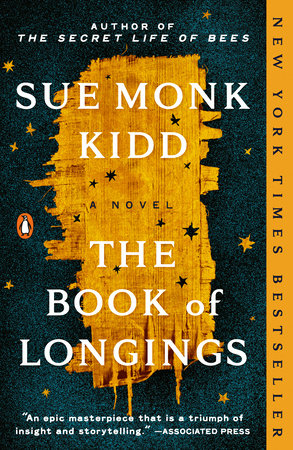The Book of Longings by Sue Monk Kidd is an inspiring novel of one woman’s bold struggle to realize her own passion and potential. The story is set in the First Century and begins in Sepphoris in the geographic center of lower Galilee.
Ana, 14, is the daughter of a wealthy Roman sympathizer. Although it is against tradition for a woman to read and write, Ana’s father indulges her, even furnishing her with writing materials and books. She is a bright, intelligent girl, but also rebellious and ambitious. Her constant companion is her Aunt Yaltha, a witty, fun woman who encourages Ana to be herself. When her father announces that she must marry an older man, she is horrified. Not only is he repulsive to her, marriage to him would mean the end of her reading and writing. A chance encounter with eighteen-year-old Jesus at the market changes her life.
Contrary to her parents’ wishes, Ana and Jesus marry. They make their home in Nazareth and live in a family compound with his brothers and their mother, Mary. Jesus’ work as a stonemason and woodworker takes him away from home for days at a time. He learns about John the Immerser, a strange man who is baptizing people in the Jordan River. John claims the Kingdom of God is near and is seeking disciples. Jesus realizes he must follow John and become a disciple…without Ana. The prophets have no female disciples. Jesus’ mission is to bring God’s kingdom into the hearts of people.
In the meantime, Ana commits a brazen act that puts her in danger. After Jesus leaves she flees to Alexandria, where startling revelations unfold that put her in threatening circumstances.
As the story unfolds, new thoughts came to my mind, thoughts as how precious our freedoms are, such as our human rights, our right to education, to choose our occupations, and to pursue our choice of religion.
I started this novel with some misgivings. I am a Christian and I wasn’t sure if I wanted the beliefs I’d always held challenged or even altered. I was raised a Baptist, then became a Catholic at age 18, so I had two viewpoints to consider. But here is yet another viewpoint. The Bible doesn’t say that Jesus was ever married, but then it doesn’t say he was single either. I trust and am impressed with Sue Monk Kidd’s impeccable research. I found this story fascinating, for the fictionalized story of Jesus and for the amazing research of attitudes, dress, cosmetics, foods, and class disparities. Many of the facts she presents are substantiated in known history. When the author mentioned John the Immerser, I thought she was giving John the Baptist a fictionalized name, but when I researched it, I learned some Christian traditions used that name for John. Although the story follows the life of Ana, a fictitious character, it coincides with history and the beginnings of Christianity. I’m thankful I read this powerful book.


